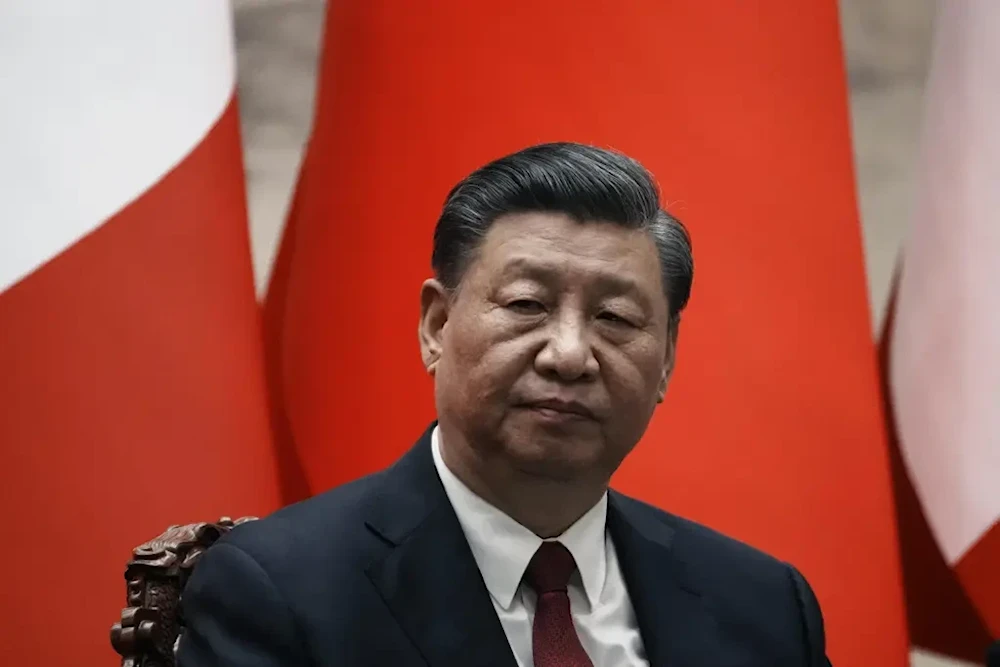China hosting Latin America summit amid US trade war tensions
China intends to deepen ties with Latin America at the upcoming CELAC summit as Xi Jinping challenges US influence.
-

Chinese President Xi Jinping gives a joint press conference at the Great Hall of the People in Beijing, China, on April 14. (AP)
China will host the China-CELAC Forum 2025 in Beijing this week, a high-level summit attended by Latin American and Caribbean officials, including the presidents of Brazil, Colombia, and Chile. The gathering aims to deepen cooperation under the Belt and Road Initiative (BRI) and expand Beijing’s influence across the region, at a time of heightened rivalry with the United States.
Bilateral trade between China and the CELAC bloc reached $427 billion between January and September 2024, according to Chinese government data. Chinese President Xi Jinping, who last addressed the forum a decade ago, is expected to deliver a keynote speech, signaling Beijing’s growing interest in Latin America as a strategic partner.
Xi Jinping to address summit for first time in a decade
This year’s forum coincides with a broader diplomatic push by Beijing, following a weekend of high-stakes China-US trade talks that concluded on a relatively positive note. While US officials hailed a deal to narrow the trade deficit, Chinese authorities described the talks as having reached “important consensus", with plans to launch a new economic dialogue mechanism.
Xi’s participation is seen as symbolic of China’s renewed push to challenge US geopolitical dominance in Latin America, as Washington attempts to shore up its own influence through economic and defense partnerships.
China pushes back against US tariffs and trade dominance
The summit also follows a new wave of tit-for-tat tariffs between the US and China, with both sides imposing duties exceeding 100% on various goods. In response, China has mobilized its global trade partners, including those in Southeast Asia, Central Asia, and Latin America, to oppose what it labels “unilateral bullying” by the United States.
In recent months, Beijing has also made progress with the European Union on trade, agreeing to negotiate minimum pricing for Chinese-made electric vehicles, a move that could defuse some transatlantic friction.
Brazil-China trade in spotlight
The China-Latin America summit aligns with Brazilian President Luiz Inacio Lula da Silva's March 8 state visit to Beijing.
China remains Brazil’s largest trading partner by a significant margin. Last year, China purchased $37 billion in soybeans alone, making Brazil its top supplier as it seeks to diversify away from US agricultural imports. Chinese authorities recently lifted restrictions on soybean shipments from five Brazilian firms, further smoothing trade ties.
Infrastructure, lithium investments high on agenda
Chilean President Gabriel Boric confirmed his attendance in a social media post and noted that he would hold direct talks with Xi. The meeting is expected to address Chinese investments in Chile’s lithium sector, particularly downstream opportunities following interest from Chinese metals conglomerate Tsingshan.
Infrastructure will also feature prominently in the talks, especially with Colombia expressing its ambition to join the BRI. The Port of Chancay in Peru, a flagship BRI project inaugurated last year, has already begun enhancing maritime connectivity between China and South America.
Last April, a Chinese delegation led by officials from the Ministry of Transport and a state-owned railway group visited Brazil to inspect sites for the proposed Bi-Oceanic Corridor railway linking Brazil to Peru’s Chancay mega port. The visit followed infrastructure agreements signed during Xi Jinping’s 2024 state visit and focused on technical cooperation to improve Brazil’s Pacific access. Over a dozen bilateral signings are expected, and the corridor aims to cut export costs for soybeans, beef, and grains while reducing reliance on Atlantic ports.
The upcoming China-CELAC Forum 2025 comes amid lingering tensions over strategic infrastructure in the region, including the Panama Canal, where US President Donald Trump recently supported a $23 billion acquisition by the US-based BlackRock consortium of Hong Kong's CK Hutchison port operations. Beijing responded by launching a regulatory review over national security concerns.

 4 Min Read
4 Min Read








